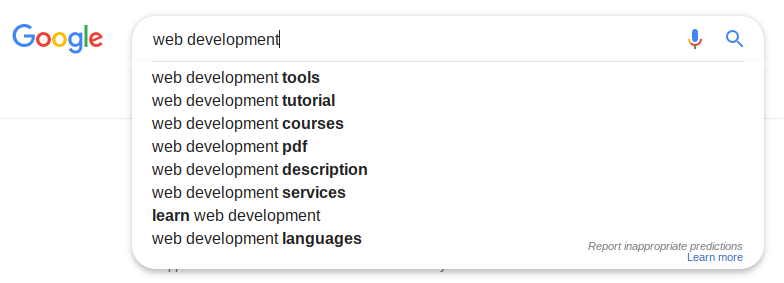How To Search For The Best Keywords
Today we will learn how to perform an effective search for the best keywords for your website and/or blog posts. I will explain what has changed and how to do effective keyword research for your business today.
Our goal here is to show you how to generate a massive list of keywords. That will be the start of your content strategy. In actual fact, if you want to have a regular supply of content for your blog and or your website, you should never ever run out of good keywords or key phrases.
Finding the best keywords to incorporate into your articles requires quite a bit of work. Once you have got your keyword or key phrase, it should be quite easy to write your story around it. So, let’s get started …
How to do an effective search for keywords?
The first thing to notice is that keyword research has changed a lot in past years; and will continue to change in the same way in the next few years. So if we do not keep up to date we could end up doing more harm than good to our SEO strategy .
Actually, to date, the manner by which we search for our keywords has also changed with respect to how the research was carried out just 3 months ago as Google is forever changing its algorithms.
Why is it important to do a good search for keywords?
Because the research of keywords will be your first step to generate an effective positioning of your blog or website. And as you know, in all online businesses, the positioning of the web plays a vital role for the survival of the business. If positioning is vital for online business then, how can we achieve the best possible positioning?
One of the best ways to position your website is by offering a solution to a specific problem that people have …
How do we know what problems people have?
Thanks to the searches carried out by users on the web we are able to interpret what they need and offer it to them. But how do we get it?
To achieve a good positioning we must create a content strategy that generates value for the users of your company. This strategy will fulfill the objective of creating visibility. That is, attract qualified traffic to your website thanks to content marketing.
If you just think “marketing of what?” You may not have planned the contents that your audience needs. It does not mean that you do not know what your audience wants. But that you do not have it planned with an order.
You may not know what your audience wants either but that is another issue. That we can address in another article where we will talk at length about marketing of contents.

That’s why I recommend you start planning it as soon as possible. As they say in marketing, “You can catch more flies with honey than you can with vinegar.”
Let’s continue …
In any SEO content campaign, obviously the content plays a totally essential role for visibility. That’s why at the time of writing content we always have doubts like:
- Will someone look for this that I am going to write?
- What will be the best title, thinking about SEO?
- Does this content contribute value to my SEO strategy?
To answer these questions, the keyword research process acquires a special relevance as it will help us to know:
- What kind of keywords does our audience use?
- Which of those keywords have the highest search volume?
- Which of those words have a high or low difficulty?
- If those keywords have real value for my business …
This process will help us to better define the effective web structure.
It will help us generate a list for each part of the web, that is, generate:
- Keywords for the purpose of the home page
- Some keywords to use in the categories
- Keywords to use in products or services
- Other keywords to generate articles
- List of words that we can use in the SEM strategy
Now, you will be thinking, okay, I know what the importance of keyword research is; I know it will help me separate the keywords for each web content, but…. How can I do it and where do I start?
How to search for keywords for your SEO strategy?
First of all, I think that everyone’s thinking is what tool do I use? Which offers me the volumes of the keywords? Is there a free tool that offers us an approximate volume of the searches that a keyword had to the month, year, or at a certain time?

If you are one of those who have thought of these questions first, it is normal. But this is not the correct way to start! Before all this, the most important thing is to create your process to do an effective investigation.
As I’ve explained at the beginning, the tools change over time, which means using others and adapting the new ones. I will explain the following steps to get an infallible research process that, even if they change, the tools will continue to serve you over the years.
These steps will serve to generate a research of keywords for your website and your content strategy. So you can find out what words can generate content, and what concepts will be discussed on your blog or website.
Step 1: Make a list of relevant topics about your business
To start this process it is very important that you know well what services you sell , what solutions you provide to your ideal client and what you are good at or better than others.
These general topics will help you to mark the line of contents of your online business. The content strategy begins in this phase. Well, now you will be thinking and what tool we can use in this step. Well, you have to use the most effective tool of all, your brain.
Here you only have to create a list of approximately 10 vital topics for your business and translate it into your Excel spreadsheet.
Step 2: For each topic a general list
For each topic we will perform a brainstorming and obtain a broad list of keywords related to the subject. If you already have the list of vital topics for your business now is when you want to identify the most important keywords for each topic.
Think for each topic, keywords that you think your customers are looking for. Use your criteria to obtain a list for each topic.
At this point, it is always good to do a brainstorming with your co-workers, or with your friends, family, clients, etc. Do not be afraid to add keywords that you think will work, the more the better.
Keep in mind that you are on the second step, it is not the definitive list of your keywords, and however we need it to be a very broad list of keywords related to the term.
Note: You will find much more tips to help you search for the best keywords in my FREE Internet Marketing course. Click on the banner below to register …
A tip …
Empathy: Ask yourself what your audience wants to find on your site.
If a person wants to find “tools to investigate keywords” it is very likely that he will also look for:
- Free tools to research keywords
- How much do these tools cost, can I afford it?
- They are for large companies or small, what type of companies use these tools?
With this trick I want it to be clear that the word “tools to investigate keywords” is the general concept and that from there you can generate many more words. They will be keywords that help answer the questions that your audience asks and that serve to give answers to the problems. We must use tools that help us obtain words related to the term.
The best keyword research tools available
Google Instant
Type a keyword in the google searches and you will be suggested a number of ideas in 4 or 5 seconds which are related to your keyword. These keywords or sentences are what Internet users are frequently searching for.
Don’t you think this is a great way to start with?
Okay, let’s give it a try. Let’s say that we want to write an article about “web development”. I am entering this idea in the Google search bar, and boom, that what I have in return within a couple of seconds …

Each and everyone of these suggestions can have you to write a full on article for your blog or your website!
So, what do you do next? … Add them to your initial excel list!
Many of the SEO professionals use this tool to start and almost finish the keyword research. With this tool they can discover and extract almost all the keywords they need.
But there are two problems with it as far as I am concerned …
Google often decide to change its tool as it did again not too long ago. And now the keyword planner has stopped showing the search volumes of those keywords, which to me is one of the most important information that a webmaster needs in order to compete on the Internet.
As you will realize it is quite a task, and at the end of a busy day, the most important data that you would need to beat the competitor is not given! Instead, you are given a whole lot of informations that you and me have no use for.
Luckily, you do not need to use the Keyword planner, as there are much simpler software or plugins that can do a much better job without blasting you with tons of useless information. We will talk about that a bit later.
What can we do with this tool?
Get a broad list of words related to the keywords search you’ve done. Remember that list of keywords we identified in step 1?
This list will help you figure out words to write your articles, categories, and important pages of your business. In another article we will talk in depth how to use this tool after the changes and especially what alternatives exist to obtain volumes of searches like those given by this tool.
But for now, let’s talk about another tool that is used to obtain words related to a term and that is free to try for a while. I have been using this keyword research tool since it was created, back in 2009, which I personally believe it is the best one that is available. It is the most powerful keyword research tool on the market.
It has always improved over the years but always will the user in mind. The great thing about it is that it only returns the most useful data that you will need to do your research efficiently, no extra fluff to impress you with loads of big numbers, nothing but just the necessary data. It is called Jaaxy. Have you heard of it?
You can try it to judge for yourself. Just enter any keywords you like in the space below and let it search for you …
Happy? Okay, let’s continue …
There are other keyword research tools on the market of course. So, in order to give you a choice, we have …
Seobook
This one may be useful as it helps you to get related words and with the monthly search volume. It performs the same function as the google tool with the only difference that offers fewer keywords. Another tool that I used to use before I tested Jaaxy, but it only generates very broad lists of keywords. It is …
Ubersuggest
This tool can generate a broad word list related to the term we are looking for. The advantage of this tool is that it offers keyword results with variants. These variants are arranged in alphabetical order. But again, loads of extra information that you don’t really need.
Now, if you have decided to use the Jaaxy keyword research tool, you don’t need to continue with this tutorial. If you prefer not to go for the Jaaxy keyword research tool, then there is much more work for you …
Step 3: Collect all the keywords in an excel document
For your info: All the keywords of all the lists of the tools are passed by the Google planner again and thus we will have a homogeneous complete list.
Once you have all the keywords exported in several lists, I recommend that you gather them all in a single Excel sheet to be able to separate later.
What you have to do in this step is to gather all the keywords that you have obtained in the various tools (except Jaaxy) and pass them all at once through the Google keyword planner tool to obtain the traffic estimates and possible impressions.
It is true that now that Google change your tool we do not have the volume of the exact words, however, we can sort the words by the estimated impressions or by the competition that has that word and we can find out which are the best numbers.
Until September 2016, this tool offered the estimated volumes for each of them, but now only the intervals appear, such as 1k to 10k, and in that interval the truth is that many volumes fit.
Step 4: Checking the positioning of your site
This step is for those websites that have existed for a long time and that have more or less baggage and therefore are already receiving visitors. If you are reading this article because you are going to create your blog, company website or e-commerce do not worry about this step now.

In this step we want to check which keyword of the previous list is currently positioned and if so, know what content it is associated with.
Normally a word positioned in Google directs the user who clicks on it to a specific URL of your site. I say “normally” because sometimes it is true that you can position two contents for the same keyword.
You have to be careful with this since you can generate what is called “cannibalization of keywords” that occurs when the same or similar keywords are used in several landing pages of a website. When this happens Google is not able to decide which content is most suitable for the user and in the end it does not show any.
In summary, this step is very important not to create service pages, or categories vital to the business with the same words and avoid the “cannibalization of keywords”.
What tools are we going to use in this step:
The Google Search Console
If your website already has a background and has been working for some time, it should be registered in the old Google Webmaster tools (GWMT) now called Search Console. If you have not yet set it up, what are you waiting for? … here is the link.
Search console shows you in its search traffic / search analysis section a complete list of the keywords that your audience has found you for. The list tells you for each word how many clicks, impressions you have received and in what position you appear in Google.
For each word, it also tells you the page to which it leads so, in addition to obtaining a complete list of keywords, you will know what type of content is having the greatest impact on your audience. Download the list in Excel and you can join it to the list you have created with the other tools and you will know which keywords are already on your site generating traffic.
Step 5: Filtering and segmentation
This is the most important part of the keyword research.
If you remember the objective of the article is that you can develop a massive list of keywords to be the start of your content strategy. To finish the investigation correctly you must join in a total list of Excel all the words, some will be positioned and others will not, do not worry because the ones that you have positioned will also be segmented by each section and we will see if it corresponds with the ones that you currently have.
“Segment the words for each section you have”
As you have seen before we want to avoid using the same keyword in different sections of the web.
By having a list for each section, it will only be necessary to know which words are more important and which ones we should use to write our texts on the web.
This work, since Google Adwords updated its keyword planner tool, makes it more difficult for us without any paid for tool since it does not show us the real value of the search level, so with these tools you can segment using the level of bidding since it would correspond to the level of competence that that word has.
To know in depth the level of searches and the difficulty of keywords we can use the following not for free tools:
- Semrush
- Ahref
In the meantime, you can use the columns offered by the Google planner, such as:
- Competition. As cited by Google: “Competition” is the number of advertisers displayed for each keyword compared to all Google keywords. How to use it: it will let you know how competitive an ad placement is for a given keyword.
- Search level: The average number of searches for this keyword and its near variants based on your targeting settings and the date range you selected. You can use this information to see how popular your keywords are during a certain period of the year.
Conclusions of this guide to do keyword research
I hope this guide helps you see the importance of choosing the correct keywords before you start and write content for the sections for your website and your blog content.
It is always good to follow the three maxims:
- Plan
- Develop
- Control
… in any project you do on your blog or website, but especially in your search for keywords. Discard the keywords with which you cannot compete, always keep in mind that you have to be realistic in the investigation.
Summary of the keyword research article:
- Segment your services
- Investigate keywords for each service
- Store your words in a document
- Check if you are already positioned
- Filter each word in each section
And you will find more or this subject and other topics in my FREE Internet Marketing course by clicking on the banner below …
Thanks for taking your time to read this guide …

If you have any tips to share with us on the subject of how to search for the best keywords, we had like to hear about it. And, if you have any questions, please use the comments’ area below. You should normally receive a reply within the next 48 hours.
If you liked this article, please do share it socially. Also post a comment with us here below, I will be very grateful!
As a Premium Member at Wealthy Affiliate, I learned how to share my passions with the world. You are very welcome to become part of my team of very successful netpreneurs. You too can become a successful business owner and live your laptop life. I will be your personal mentor for FREE. It is 100% FREE to join, learn and earn! Click the button below and let’s …



Comments
How To Search For The Best Keywords — No Comments
HTML tags allowed in your comment: <a href="" title=""> <abbr title=""> <acronym title=""> <b> <blockquote cite=""> <cite> <code> <del datetime=""> <em> <i> <q cite=""> <s> <strike> <strong>